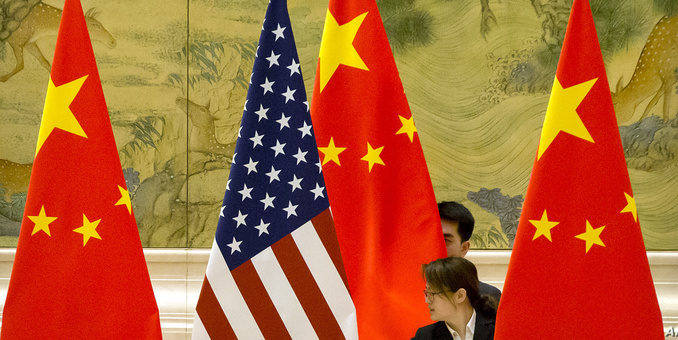
Are China and the United States any closer to a broad trade agreement after more than 2½ years of talks?
Leaders on both sides are routinely optimistic about reaching a deal, even if there are usually few specifics.
Friday was no exception when U.S. trade representatives released a statement saying negotiators in the latest round “made progress in a variety of areas and are in the process of resolving outstanding issues.”
President Donald Trump and Chinese President Xi Jinping were expected to sign a preliminary deal, called “Phase One,” during the Asia-Pacific Economic Cooperation summit, originally scheduled for Nov. 16-17 in Chile. However, Chilean President Sebastian Pinera on Wednesday threw those plans into disarray when he canceled the summit over spreading civil unrest in his country.
In a tweet Thursday, Trump wrote, “The new location will be announced soon. President Xi and President Trump will do signing!”
Also on Twitter, the president said that the Phase One agreement being negotiated would cover “about 60% of [the] total deal,” though it was unclear how that percentage was calculated.
Terms of emerging agreement
The terms of the initial agreement have not been finalized, but are broadly understood to include the resumption of Chinese purchases of American agricultural goods and other products, like airplanes, as well as a joint agreement to refrain from currency manipulation and increased protections on intellectual property for non-Chinese businesses operating in China.
And, as far as that goes, the prospective agreement has the support of large segments of the U.S. business community.
“Negotiators continue to move in the right direction, and making progress towards a comprehensive, high-standard and enforceable deal with China remains our top priority,” said Myron Brilliant, executive vice president and head of international affairs at the U.S. Chamber of Commerce. “While it’s clear that there’s still work to be done to address many of the most important U.S. trade and investment priorities, the U.S. Chamber will continue to lend its full support to any and all efforts that level the playing field for American businesses.”
However, while global markets have reacted positively to the prospect of the deal, its terms seem to represent mainly the low-hanging fruit in the U.S.-China trade relationship. China has indicated that further concessions will be conditioned on the removal of punitive tariffs imposed by the Trump administration over the past two years — something experts say Trump is unlikely to agree to.
U.S. targeting state-run enterprises
For its part, the U.S. wants to see China eliminate, or at least scale back, the state-run enterprises that dominate large sectors of its economy. These firms increasingly compete globally with what traditional Western market economies view as unfair advantages, including cheap government-backed financing and favorable regulatory treatment.
However, the Chinese Communist Party, which completed a four-day meeting of top leaders Friday, has made it clear that no such changes are forthcoming.
At a press conference Friday, Han Wenxiu, executive deputy director of the General Office of the Central Financial and Economic Affairs Commission, insisted that no reform of state-owned enterprises was necessary because they already “follow market rules and take part in competition on an equal basis with others.”
Claims like that one are routinely disputed by foreign governments and by international businesses that compete with Chinese state-owned enterprises.
Slowing global economy
As the U.S. and China proceed toward whatever endgame they can achieve, the global economy is suffering from the slowest growth it has seen in a decade.
This week, market analysis firm IHS Markit noted that across Southeast Asia, a key indicator of economic growth is looking ominous. The Purchasing Managers’ Index, which monitors factory orders, has slid toward recession not just in China, but in Japan, South Korea, Vietnam, Taiwan and Indonesia.
In Europe, meanwhile, where a new set of U.S. tariffs on specific goods has just been implemented, uncertainty about the economic future has so unnerved investors that many are now effectively paying the government to hold money for them by investing in bonds that carry a negative interest rate.
In an op-ed published Friday by Bloomberg, Roberto Azevedo, director-general of the World Trade Organization, pointed to trade tensions as the dominant concern among leaders at last week’s World Bank and International Monetary Fund summit.
Trade tensions
“Trade tensions, they believe, are now the main thing holding growth back,” Azevedo wrote, adding that WTO economists have downgraded global economic growth forecasts for 2019 from as high as 2.6% in April to only 1.2% last month.
“The real damage to growth arises from uncertainty over future market access for all goods and services,” Azevedo wrote. “Before committing resources to a new project, businesses want to understand the risks. If new tariffs might wipe out profits, investors will pause, regardless of how cheap capital might be. In this way, trade uncertainty increases the danger that low interest rates will drive funds into riskier, higher-yielding financial assets. That kind of investment doesn’t add to capacity or improve productivity. Instead, it exacerbates financial volatility and fragility.”
Source: Voice of America